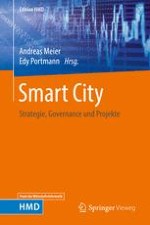2016 | OriginalPaper | Buchkapitel
2. Smart Governance in Smart Cities
verfasst von : Konrad Walser, Stephan Haller
Erschienen in: Smart City
Verlag: Springer Fachmedien Wiesbaden
Aktivieren Sie unsere intelligente Suche, um passende Fachinhalte oder Patente zu finden.
Wählen Sie Textabschnitte aus um mit Künstlicher Intelligenz passenden Patente zu finden. powered by
Markieren Sie Textabschnitte, um KI-gestützt weitere passende Inhalte zu finden. powered by
